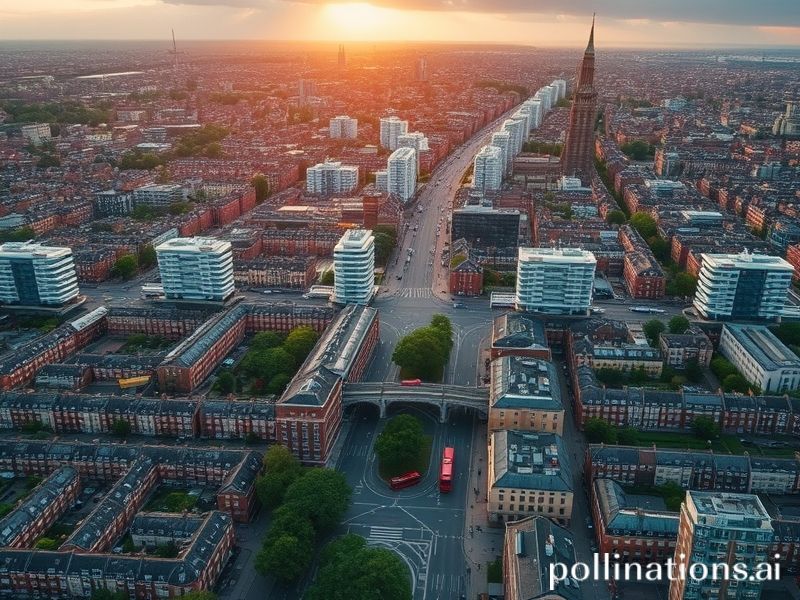Britain’s Population Boom: How a Rainy Island Just Became the World’s Largest Accidental Employer
Population Boomerang: How the UK’s Sudden Growth Spurt is Everyone Else’s Problem Too
The Office for National Statistics dropped its latest head-count last week and, lo, Britain has quietly swollen to a record 68.3 million souls—roughly the population of Thailand, but with markedly worse weather and a keener interest in queue etiquette. At first glance this looks like a purely domestic affair: more Londoners breathing the same cubic metre of nitrogen-flavoured air, more Mancunians pretending the rain is “atmospheric.” But on a planet that just ticked past eight billion, no spike is local. When a soggy island best known for losing empires suddenly adds the equivalent of another Ireland in under a decade, the rest of us ought to ask why—and who’s footing the bar tab.
The arithmetic is almost insultingly simple. Net migration is running at about 672,000 a year—roughly one Reykjavík, or the entire population of Montenegro deciding to try Greggs for breakfast. Births, meanwhile, have slumped to their lowest since the Black Death had a crack at brand management. In short, the UK is outsourcing its reproduction to other countries and then acting surprised when the arrivals lounge at Heathrow resembles a United Nations flash-mob.
Global implications? Start with remittances. Polish plasterers, Filipino nurses, and Nigerian software engineers currently wire home enough cash every year to bankroll the military budgets of several Baltic states. That’s money not spent in British pubs—sorry, “gastropubs”—but it props up consumption from Lagos to Lahore. Kenya’s M-Pesa vibrates a little more enthusiastically every time a Kenyan care worker in Leeds remembers her kid’s school fees. The pound may be the sick man of the G7, yet it still buys a frightening amount of antibiotics in Uttar Pradesh.
Next, consider housing—or the absence thereof. London’s average property now costs 14 times the average salary, making it a delightful place to launder oligarch money and an impossible place to raise actual humans. The ripple effect is international: Canadian lumber, German concrete pumps, and Chinese steel all queue up to build rabbit-hutch flats that locals can’t afford and that sit half-empty because the absentee owner is a Kazakh pop star who prefers Dubai. Global supply chains strain, carbon footprints enlarge, and somewhere a polar bear files a complaint with HR.
Then there’s the geopolitical optics. Brexit was sold as “taking back control of our borders,” a phrase now filed under “famous last words” somewhere between “peace in our time” and “new coke.” Instead, the UK is hoovering up the very workforce that the EU’s ageing south is crying out for. Spain’s countryside is emptying faster than its sangria pitchers, while British geriatric wards hum with Spanish-speaking staff who learned English from TikTok. The irony is so dense you could drizzle it on chips.
Demographers note that the UK is merely front-running a trend. By 2050, half of all population growth in the developed world will come from migration, because the native-born are too busy doom-scrolling to procreate. Japan, still pretending robots will solve everything, watches nervously as Britain’s experiment unfolds. If multicultural rainy island can absorb a city-sized intake annually without actually dissolving into the sea, the argument for opening the gates elsewhere becomes harder to swat—especially when pension systems are dangling over actuarial abysses.
Of course, the migrants themselves aren’t immune to the cosmic joke. Many arrived chasing the glossy brochure version of Britain—red buses, polite bobbies, afternoon tea—only to discover that “affordable rent” is a fairy tale and that “British cuisine” now means Deliveroo from a Nepalese ghost kitchen. Their children will grow up bingeing American Netflix, ordering Korean tacos, and wondering why their parents romanticised a country that can’t keep the heating on. Cultural assimilation, twenty-first-century style: everyone ends up slightly disappointed, but at least the Wi-Fi is fast.
So what does the UK’s growth spurt ultimately signify? That in a world of collapsing birth rates and rising seas, humans will still trudge across continents for the privilege of paying £6 for a pint. That “global Britain” is less a nostalgic slogan than a desperate staffing agency. And that the next time an island nation claims it’s full, the rest of us should check the attic—it’s probably packed with flat-pack furniture, foreign degrees, and the faint whiff of empire.
The ledger, as always, balances unevenly. Britain gets workers, consumers, and just enough tax revenue to pretend the NHS isn’t on life support. The planet gets another crowded archipelago pumping out reality-TV formats and questionable foreign policy. And the migrants? They get a rain-soaked upgrade from wherever they left, plus the eternal right to complain about the weather—now a universal human experience, passport not required.







